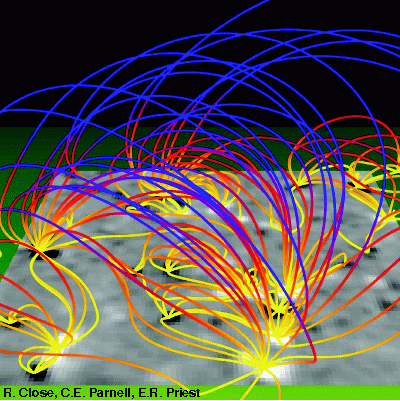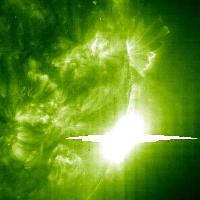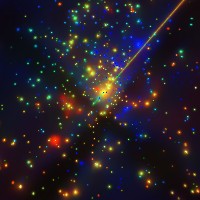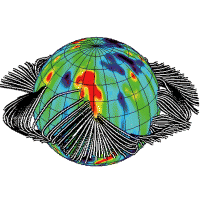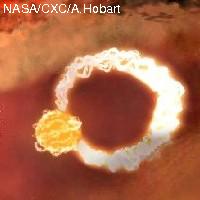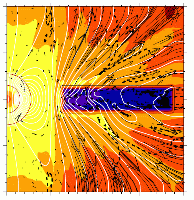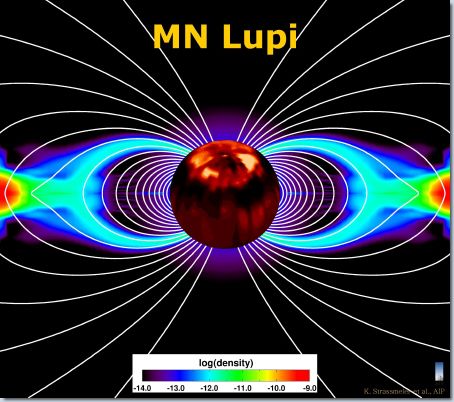
|

|
Max-Planck-Institut für Radioastronomie
Bonn, Germany 12 - 13 December 2006 |
Travel Participants Program Conference Photos Proceedings Contact Conference Poster
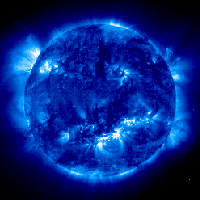
Scientific Rationale
X-ray and radio observations provide clear evidence for coronae not only, as expected, in solar-like late-type stars, but also in fully convective, very low-mass stars and even in brown dwarfs. Furthermore, young stellar objects generally show highly elevated levels of coronal activity. Coronae already exist in extremely early protostellar stages where the nuclear activity has not yet started. Finally, also accretion disks, which exist around very different classes of objects such as protostars, degenerate stellar objects, and supermassive black holes, can be surrounded by a corona; a turbulent disk dynamo can drive coronal activity, which plays an important role in disk accretion as well as the launching and collimation of outflows.
Whereas significant progress in our understanding of coronal physics has been made during the last years, many aspects like the generation of magnetic fields in MHD dynamos, the heating of the coronal plasma, acceleration of particles, the complexity of coronal plasma structures and their interactions still continue to pose big challenges to observers and theoreticians.
The aim of this conference is to review the current status of the knowledge about coronae in various environments, like the Sun, stars, young stellar objects, and accretion disks. An important goal is to identify physical mechanisms that are common to all environments. Observational results as well as theoretical aspects of coronal magnetic structure and evolution will be discussed in order to spotlight existing analogies and differences.
The conference will consist of the following sessions:
- MAGNETIC RECONNECTION IN THE SUN AND STARS
- SOLAR AND STELLAR CORONAE
- YOUNG STELLAR OBJECTS
- ACCRETION DISKS
Review topics and invited speakers
SESSION I: MAGNETIC RECONNECTION IN THE SUN AND STARS
1.1 Magnetic reconnection and flares --- C.E. Parnell / E.R. Priest (University of St. Andrews)
1.2 Solar flares --- L. Harra (Mullard Space Science Laboratory)
1.3 Preferred active longitudes in sunspot activity --- S. Berdyugina (ETH Zuerich)
1.4 Stellar flaring periodicities --- M. Massi (MPIfR Bonn)
SESSION II: SOLAR and STELLAR CORONAE
2.1 Flux Emergenge in fast rotating stars --- V. Holzwarth (University of St Andrews)
2.2 Spots on stars, Doppler Imaging --- K. Strassmeier (AIP Potsdam)
2.3 X-ray and radio emission from stellar coronae --- M. Guedel (Paul Scherrer Institut)
2.4 Heating the solar corona by currents --- B.V. Gudiksen (University of Oslo)
SESSION III: YOUNG STELLAR OBJECTS
3.1 What can X-rays tell us about magnetic fields, accretion and mass loss in young
stars? --- T. Montmerle (Laboratoire d'Astrophysique de Grenoble)
3.2 The origin of X-ray emission from T Tauri stars --- Th. Preibisch (MPIfR Bonn)
3.3 The spatial structure of coronae of T Tauri stars --- M. Jardine (University of St. Andrews)
3.4 MHD aspects for star-disk-jet magnetic systems --- J. Ferreira (Observatoire de Grenoble)
SESSION IV: ACCRETION DISKS
4.1 Accretion disk coronae in AGN/microquasars --- A. Merloni (Max-Planck-Institut fuer Astrophysik)
4.2 Dynamos in accretion disks --- A. Brandenburg (NORDITA)
4.3 Flares in accretion disk coronae --- J. Malzac (Centre d'Etude Spatiale des Rayonnements)
4.4 Jet-Corona coupling --- A. Lobanov (MPIfR Bonn)
Scientific Organizing Committee
Local Organizing Committee: Maria Massi, Thomas Preibisch, Jan Forbrich, Marina Kaufman Bernado, Maria Salas, E. Fingas
Conference Venue
Proceedings
Timeline
Please make your own hotel reservation as soon as possible.
Please read the Presenter Instructions
and send us your presentation before the conference!
Deadline for manuscripts for the proceedings will be 1. February 2007.
Travel Participants Program Conference Photos Proceedings Contact Conference Poster
